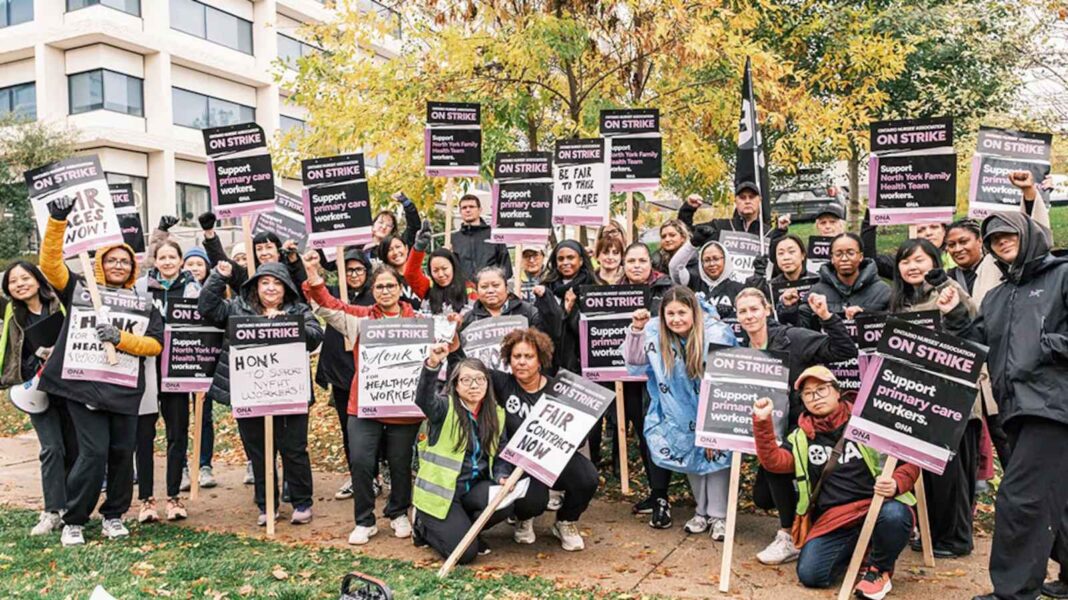Striking health-care workers in North York say their employer misused provincial funding that should have gone toward wage increases and recruitment efforts.
But officials with the North York Family Health Team (NYFHT) say the money was “administered in full compliance” with ministry guidelines and that they “remain committed to good-faith collective bargaining” to end the weeks-long strike.
Forty-four nurses and health-care professionals, from pharmacists to social workers, have been on strike since Oct. 20, leaving more than 95,000 patients without access to the team-based primary care provided by NYFHT.
Rita Ha, the group’s bargaining unit president, told CTV News Toronto that members want to see accountability being taken by NYFHT and the province, which is part of why they’re “stuck” striking for the sixth consecutive week.
“We’re telling the employer, ‘Okay, you say you’ve done what you need to do,’ and the government is saying, ‘We’re not getting involved,’” Ha said.
“At the same time, what we’re trying to get the government to hear is, you’ve given our family health team taxpayers money—you’ve given them money to do whatever that announcement was for recruitment, retention, expansion of primary care—but you’re not really looking at what’s happened to it.”
In June, the province announced $235 million in funding to be put toward new and expanded primary care teams, as part of the Primary Care Action Plan. With this investment, Ontario Health Minister Sylvia Jones said $142 million would be given to primary care teams across the province so it can be used to recruit and retain health-care workers over three years.
The union says NYFHT used its share of that funding to address its deficit.
Nureen Ladha, NYFHT’s Interim Executive Director and CEO, and Dr. Tim Li, NYFHT’s Board Chair, denied this claim in a joint statement. They said NYFHT designated the funding appropriately for staff and was compliant with the province’s “funding framework and financial policies that govern community-based healthcare organizations in Ontario.”
“NYFHT’s financial management practices are regularly monitored, reported, and audited in accordance with provincial requirements, and all expenditures align with these established guidelines,” the statement reads.
“We want to see our staff competitively compensated for the important work they do. We continue to operate responsibly within the funding provided by the provincial government, while advocating for increased funding and flexibility to better support our teams and patients.“
In a statement to CTV News Toronto, Ontario’s Ministry of Health said it is not involved with the bargaining efforts but is encouraging both parties to stay at the table and work toward a fair and sustainable agreement that supports patients and staff.”
The ministry did not comment on the funding stipulations.
Ha said, at the end of the day, the union just wants fair wages for its members.
“What’s on the table is zero per cent, like that’s what we’ve been bargaining for 18 months, and it’s always been zero per cent,” Ha said. “It’s not fair. It’s like they are offering this zero per cent despite the fact that the government has invested money into primary care for recruitment, retention.”
For their part, Ladha and Li said they want to see NYFHT staff competitively compensated for the work they do, adding they are determined to find resolution with the union that supports the patients and the team.
“We do not want to see an ongoing service disruption for our patients and remain committed to good-faith collective bargaining,” NYFHT said.
How this strike impacts more than 95,000 patients
While the number of workers on strike is relatively low, with 44 people on the picket line, Ha says the workers service more than 95,000 patients altogether because of the number of services they provide.
“We don’t just cover nurses, we include social workers like mental health, nurse practitioners who do cancer care screening, cancer care follow-up,” Ha said, adding they also have international teams, dietitians, pharmacists who cover diabetes care and nurses who work out of physician offices.
“We’re talking thousands of visits and thousands of encounters that we would normally be doing to support the family physicians is not happening.”
This has led to some patients being sent to the emergency room to get care or patients with mental health crises going to doctors ill-equipped to handle their needs, Ha said.
“Colon cancer survivors are not able to be screened for a recurrence of the disease by their nurse practitioners, group health programs are not being run, and home-bound patients are not being seen,” Ontario Nurses’ Association (ONA) Provincial President Erin Ariss said in a news release on Tuesday.
“There is a long list of care and services that North York patients are missing, as the board of this health team refuses to negotiate a fair first contract with their highly skilled staff.”
Have your health-care services been impacted as a direct result of this weeks-long job action? What alternative have you sought out in the meantime? We want to hear from you.
Share your story by emailing us at [email protected] with your name, general location and phone number in case we want to follow up. Your comments may be used in a future story.
CP24


